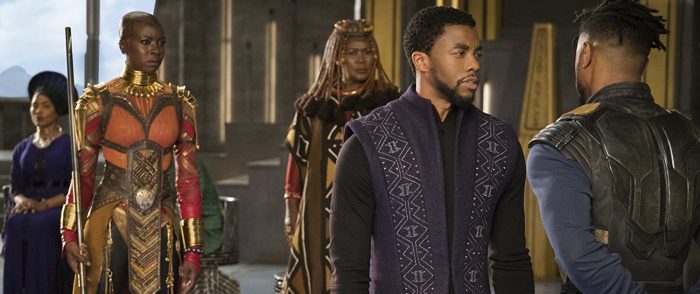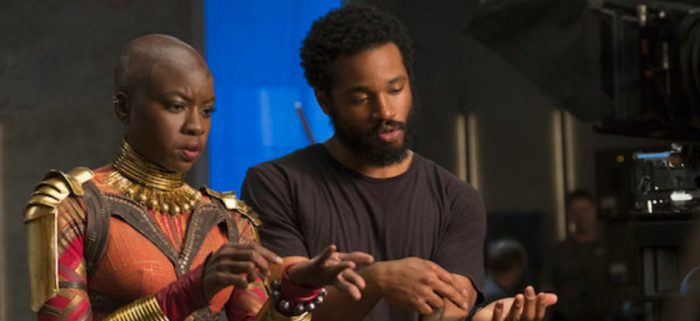‘Black Panther’ Editor Michael Shawver on Working With Ryan Coogler and Being “Popular” at the Oscars [Interview]

Editor Michael Shawver first met Ryan Coogler nearly eight years ago. They were both film students at the University of Southern California and shared a passion for films about important issues, basketball, and Batman. Impressed by Coogler’s short films that he had directed in class, Shawver suggested that they team up, and the pair have been basically inseparable ever since — working together on all of Coogler’s major films, from Fruitvale Station, to Creed, and finally, to Black Panther. As Coogler’s star has risen, the director’s partnership with star and muse Michael B. Jordan has been feverishly written about, but less so has Coogler and Shawver’s long and trusting partnership.
“We absolutely do [have a shorthand],” Shawver told me in an interview on Black Panther on the heels of the Marvel film’s Critics’ Choice Award nominations. “We can kind of tell just by knowing each other. So I’ll do what I can to protect him and vice versa.”
Shawver and Coogler have rapidly risen in the industry since they were making short student films eight years ago. Now their latest collaboration Black Panther, the critically acclaimed pop culture behemoth that Shawver co-edited with Debbie Berman, gathers more awards buzz by the minute. There’s even talk about it getting a Best Picture nomination at the Oscars. But Shawver is trying not to think about that.
“Just the thought that I’d have this tiny, minute piece of my voice in this movie and at least be a vessel for how this movie gets out there, is honestly the reward,” Shawver said. We talked about his and Coogler’s long journey to Wakanda, and where they look to go from here. Plus Shawver reveals the hardest scene he had to edit in Black Panther, and how it beget one of the standout moments of the film (Hint: “Hi Auntie.”)

You’ve been working with Ryan Coogler as a team through Fruitvale Station and Creed, to Black Panther. How have things changed in the five years since then?
Well it’s actually more like eight years, because we met in film school. We both went to the University of Southern California and we were in a directing class together. He was making short films that were just relevant and about important issues, and that’s kind of the reason I wanted to get into making movies. So I went up to him one day and said, “Hey I want to work with you, and I edit a little bit.” Fortunately there was a class in school that in every way is kind of a small version of a film set, and we became a team and learned how to work. We actually started collabing in school, which is great because you have a bit of a safety net. Nobody’s putting millions of dollars on those movies. And I think [it helped us form] that mentality of “What’s the best story that we could tell?”
And I think the big thing with Ryan and myself is that we’ll both be the first people to admit we’re not the smartest people in the room. We know that we have so much to learn. On Fruitvale, we screened the movie early on with some professionals we trusted and we did the same thing again with Creed and then Black Panther, so that hasn’t changed. I think what’s really changed is the size of the movies. We try to keep the same process but there’s a huge difference for Ryan with directing a crew of only 50 people and directing a crew of hundreds of people. And Ryan’s the kind of filmmaker that wants every single thread of the movie to be as real and authentic as possible, because we know the audience is smart and will call B.S. if they feel otherwise. So Ryan is out working with these other departments that we’ve never worked with before, so he puts more and more trust in his editors — you know, me — to tell my story with the movie and say, “Look we’ve been through this, we trust each other, we trust our process.” And with Black Panther, I only spoke to Ryan a handful of times during production. We’d talk about cuts, he would call and say, “Hey what do you think about this?” And especially on Black Panther, every department is responsible for some part of the movie as a whole, and as an editor on those movies, I would be in meetings to talk how we can make this action scene better, what shots can we do, what lines can we add to the movie to make it better, to make it clearer, to make it a better experience for the audience. I think those tough days early on where we didn’t really know what we were doing, and sort of trusting our gut and taste — because that’s why we get into making movies, because you feel like you have good taste. And then you make something and look at it and wonder, “Why the heck was this terrible?” and you keep doing it more and more to close that gap from where you are. That process has evolved to the point where now we feel like we kind of have a handle on things, and we’re always there for each other, but the trust has only grown stronger.
Since you’ve developed such a strong partnership, do you have a shorthand for working with each other? How do you guys communicate?
It’s an interesting thing because there are so many different people involved. We absolutely do [have a shorthand], you could say at the speed we say words to each other when we talk, sometimes people ask, “Wait, what did you guys say?” Half the time we’re talking about Batman or basketball or something else, but in a lot of ways it helps because when Ryan’s off doing something else, even if he doesn’t say it, I can kind of read him in a room. We can kind of tell just by knowing each other. So I’ll do what I can to protect him and vice versa. But at the same time, we look at our team as like a filmmaking family: everybody should feel ownership, everybody should feel value and respected. So at the same time as having this level of communication that is wonderful, we try to bring everyone else into the fold with us as well. Ryan fully believes that the people who make the movie are more important than the movie itself. So anytime there’s anyone’s having a tough time or a bad day, or even a national tragedy, Ryan will stop and call a meeting to make sure everyone’s okay. We want everyone to buy into that because we believe that’s what makes the best movies. Especially something like Black Panther, which brings people together. The only way to make it universal is to have everyone involved to tell a story.
Continue Reading Michael Shawver Interview on Editing Black Panther
The post ‘Black Panther’ Editor Michael Shawver on Working With Ryan Coogler and Being “Popular” at the Oscars [Interview] appeared first on /Film.
from /Film http://bit.ly/2TfxjPQ
via IFTTT
Comments
Post a Comment